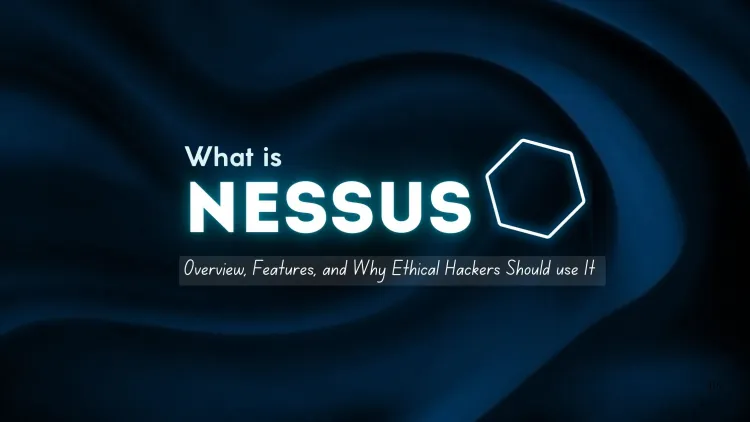What is Nessus | Overview, Features, and Why Ethical Hackers Should Use It
Nessus is a widely-used vulnerability scanning tool that helps ethical hackers and cybersecurity professionals identify security weaknesses in networks, applications, and operating systems. Known for its accuracy, extensive vulnerability database, and ease of use, Nessus simplifies the vulnerability scanning process. By leveraging features like detailed reporting, configuration auditing, and plugin-based scanning, Nessus enables ethical hackers to prioritize and mitigate vulnerabilities effectively. Regular updates and cross-platform support make it an indispensable tool for security assessments.

Nessus is one of the most popular vulnerability scanning tools used by ethical hackers and cybersecurity professionals worldwide. Developed by Tenable, Nessus is known for its accuracy, extensive vulnerability database, and user-friendly interface. This article explores what Nessus is, its core features, and why it is an essential tool for ethical hackers in identifying and mitigating vulnerabilities.
What is Nessus?
Nessus is a vulnerability scanner designed to detect security weaknesses in operating systems, applications, and networks. It operates by running various vulnerability checks against a target system to identify misconfigurations, outdated software, and exploitable vulnerabilities.
Initially released as an open-source tool, Nessus has evolved into a commercial product while maintaining a free version for non-commercial use. Its reputation for being a reliable and efficient tool makes it a top choice for professionals conducting vulnerability assessments.
Why Ethical Hackers Use Nessus
Ethical hackers rely on Nessus for several reasons, including:
Comprehensive Scanning Capabilities
Nessus scans for over 75,000 vulnerabilities, making it an all-in-one solution for detecting weaknesses across different systems.
Ease of Use
With a straightforward interface and detailed reporting, Nessus simplifies the vulnerability scanning process, even for beginners.
Regular Updates
The vulnerability database is updated frequently to keep pace with emerging threats.
Customization
Users can create custom scans tailored to specific needs, ensuring flexibility in testing.
Key Features of Nessus
1. Extensive Plugin Library
Nessus uses plugins to perform vulnerability checks. These plugins are scripts that detect specific vulnerabilities and are updated daily to ensure Nessus remains effective.
2. Policy-Based Scanning
Nessus allows users to create and enforce scan policies, ensuring consistent and repeatable testing procedures.
3. Configuration Auditing
In addition to vulnerability scanning, Nessus checks for misconfigurations that may expose systems to risk.
4. Detailed Reporting
After each scan, Nessus generates comprehensive reports, including a summary of vulnerabilities, their severity, and recommended remediation steps.
5. Integration with Security Tools
Nessus integrates with other tools and platforms, enabling seamless workflow integration for security teams.
How Nessus Works
1. Target Identification
Nessus identifies hosts on a network, including their IP addresses, operating systems, and services.
2. Vulnerability Checks
It then runs a series of vulnerability checks using its extensive database.
3. Severity Analysis
Vulnerabilities are classified by severity (low, medium, high, or critical), helping prioritize remediation efforts.
4. Reporting
A detailed report is generated, including remediation recommendations to fix identified issues.
Benefits of Nessus for Ethical Hackers
- Time Efficiency: Automated scans save time during security assessments.
- High Accuracy: Minimizes false positives, ensuring reliable results.
- Cross-Platform Support: Compatible with Windows, Linux, and macOS, making it versatile.
- Regulatory Compliance: Helps organizations meet compliance standards like PCI DSS and GDPR.
Best Practices for Using Nessus
- Always Update Plugins: Keep the plugin library up to date to detect the latest vulnerabilities.
- Conduct Regular Scans: Periodic scans help maintain the security posture of systems and networks.
- Analyze Reports Thoroughly: Use detailed reports to prioritize vulnerabilities based on risk and impact.
- Obtain Permission: Always ensure you have explicit permission before scanning any network or system.
Conclusion
Nessus is an indispensable tool for ethical hackers and security professionals. Its powerful features, such as detailed reporting, extensive vulnerability database, and integration capabilities, make it an essential resource for vulnerability scanning and assessment. By leveraging Nessus, ethical hackers can help organizations identify and mitigate security risks, ensuring robust protection against potential cyber threats.
FAQ:
-
What is Nessus used for?
Nessus is used for vulnerability scanning to detect security weaknesses in operating systems, applications, and networks. -
Is Nessus free to use?
Nessus offers a free version, Nessus Essentials, for non-commercial use, but advanced features are available in paid versions. -
How accurate is Nessus?
Nessus is highly accurate due to its regularly updated vulnerability database, reducing false positives. -
Can Nessus detect all vulnerabilities?
Nessus can detect a vast range of vulnerabilities, but no tool can guarantee 100% detection. Regular updates improve its coverage. -
Is Nessus compatible with multiple operating systems?
Yes, Nessus supports Windows, Linux, and macOS platforms. -
What makes Nessus different from other vulnerability scanners?
Nessus stands out for its extensive plugin library, frequent updates, and ease of use. -
Does Nessus require technical expertise?
Nessus has a user-friendly interface suitable for beginners, but advanced features may require some technical knowledge. -
How often should Nessus scans be performed?
Regular scans, such as monthly or quarterly, are recommended to maintain network security. -
Does Nessus help with regulatory compliance?
Yes, Nessus helps meet standards like PCI DSS, GDPR, and HIPAA by identifying vulnerabilities that could lead to non-compliance. -
Can Nessus integrate with other security tools?
Yes, Nessus integrates with various security tools, enhancing its functionality within a larger security framework.











![Top 10 Ethical Hackers in the World [2025]](https://www.webasha.com/blog/uploads/images/202408/image_100x75_66c2f983c207b.webp)



![[2025] Top 100+ VAPT Interview Questions and Answers](https://www.webasha.com/blog/uploads/images/image_100x75_6512b1e4b64f7.jpg)







